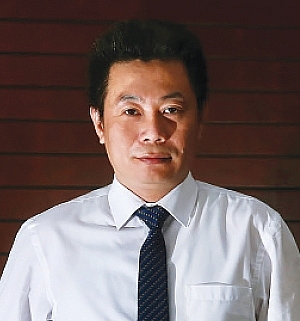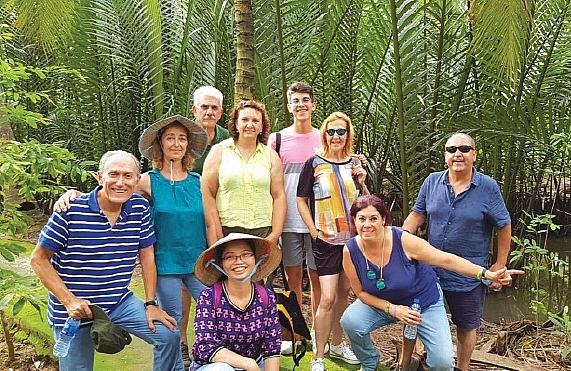Tourism industry takes preemptive measures
Economic experts say that aviation and tourism would be among the hardest-hit industries by the COVID-19 epidemic. What is your opinion about this?
 |
| Ngo Tien Duc, COO of Luxury Travel Co., Ltd. under Lux Group |
In 2019 alone, the number of passengers on 72 air routes between Vietnam and 48 destinations in China surpassed 7.5 million. However, under the impact of the COVID-19 outbreak, all flights to and from China, Taiwan, Hong Kong, and Macau have now been suspended. According to the Civil Aviation Administration of Vietnam, Vietnamese airlines are suffering an estimated initial loss of over VND10 trillion ($434 million) due to this suspension.
Statistics from the General Statistics Office show that in 2019, when Vietnam welcomed more than 18 million international visitors, Chinese tourists accounted for 32 per cent with more than 5.8 million arrivals.
The domino effect of the virus outbreak has largely reduced tourism revenue. Furthermore, many tourists are afraid of travelling to Asia at this time, which leads to increasing hotel and tour cancellations. Especially at some tourist destinations, which are usually visited by many Chinese tourists, such as Dalat, Danang, and Nha Trang, the room occupancy rate has currently fallen to only 30-40 per cent.
Thus, we can see that the COVID-19 outbreak exerts considerable impacts on Vietnam’s aviation and tourism industries. If the situation is not well controlled and there are no urgent solutions in the first quarter of 2020, we should be prepared for a much worse scenario that affects our business in the second quarter or even until the very end of the year.
Since the epidemic has still not come to a halt, what are Lux Group’s prevention strategies to minimise damages?
On the first working day after Lunar New Year, we have called for an emergency meeting for all members of Lux Group, where we figured out several solutions to deal with the outbreak.
As such, we are weekly updating our customers and business partners on the epidemic’s development, providing them with correct, reliable data and information from verified sources, which can help them to avoid confusion and make the right decision for their travels. In addition, we are negotiating with several service providers to offer specific solutions on a case-by-case basis to minimise delays or cancellations. Moreover, we are allowing customers to change the date of their journey or even cancel it if requested.
Furthermore, we are carrying out a series of measures to ensure our guests’ safety. Face masks, medical alcohol, hand sanitiser, and leaflets with helpful information on how to prevent the spread of COVID-19 are being distributed to all travellers on our tours to guarantee their safety during their stay. In addition, we have also advised our travel agents and tour guides to avoid bringing tourists to crowded areas or spots with many visitors coming from epicentres.
Besides these practical solutions, we are implementing a number of other precautions, such as rescheduling tour plans. Our customers have so far responded positively to our measures, saying that they feel comfortable and safe during their tours.
We try to stay optimistic and hope for a decrease in cancellation rates, especially since most of our customers are from North America and Europe. However, overall tour cancellations are still at an alarming high, with our sales in February reporting a 70 per cent on-year slash.
We would like to let all of our customers and partners know that we can stay optimistic as Vietnam remains a safe destination for international tourists, even during this health crisis. The Vietnamese government is showing strength in controlling the spread of COVID-19. We hope that all tourists coming to Vietnam are also always following the WHO’s and the Vietnamese government’s recommendations to ensure their safety. Finally, we hope that the ubiquitous and preventive measures soon show results and that the epidemic will soon be completely controlled.
 |
Visitors from some foreign markets have sharply reduced. Will Lux Group introduce other products to stimulate and attract more domestic tourists?
We have considered market diversion plans. This redirection will be appropriately studied by our authorised departments. However, the requirements of domestic and international tourists are very distinguished from each other in terms of culture, interests, and length of stay. Therefore, it will take time to adjust our tour designs with an efficient restructuring plan.
What do you think the government and the tourism authorities need to do to effectively support businesses and overcome difficulties caused by the outbreak?
The government has been doing well with its practical measures in controlling the spread of COVID-19 in Vietnam. However, I believe there should be more promotion campaigns to introduce the country to a wider audience. Besides this, the government and authorities could agree on a thorough policy to encourage domestic and international tourism, especially after the epidemic ends.
Some urgent supportive measures that businesses like us are also looking for include tax exemptions, credit loan packages, and favourable interest rates, which all could be applied for many tourism businesses.
In addition, the government could also extend visa exemptions for some other nationalities such as Australia and New Zealand, to draw in more tourists from these countries.
What the stars mean:
★ Poor ★ ★ Promising ★★★ Good ★★★★ Very good ★★★★★ Exceptional
Themes: Safe and Sound Vietnam
Related Contents
Latest News
More News
- Manila becomes a new check-in destination for Vietnamese youth (December 11, 2025 | 18:07)
- Vietjet launches mega year-end ticket promotion (December 10, 2025 | 11:33)
- Dalat leads Vietnam’s 2025 search trends (December 09, 2025 | 13:44)
- Vietnam welcomes record wave of international visitors (December 09, 2025 | 13:43)
- Vietjet launches daily Manila flights to celebrate year-end festive peak season (December 05, 2025 | 13:47)
- The destinations powering Vietnam’s festive season travel demand (December 04, 2025 | 18:33)
- Vietnam named among the world’s most exciting winter destinations (December 04, 2025 | 15:10)
- Phu Tho emerges as northern Vietnam’s new tourism hub (December 01, 2025 | 17:00)
- Vietjet completes Airbus A320/A321 updates ahead of deadline (December 01, 2025 | 09:49)
- Vietjet resumes Con Dao flights from early December (November 28, 2025 | 15:24)

 Tag:
Tag:




















 Mobile Version
Mobile Version